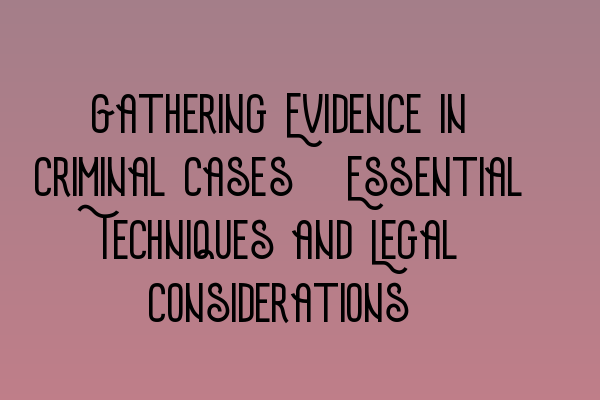Gathering Evidence in Criminal Cases: Essential Techniques and Legal Considerations
As criminal lawyers, gathering evidence is a crucial part of building a strong case. Properly collected evidence can make a significant difference in the outcome of a trial and can greatly impact the defense or prosecution’s arguments. In this article, we will discuss some essential techniques and legal considerations when it comes to gathering evidence in criminal cases.
The Importance of Gathering Evidence
In any criminal case, evidence is the foundation upon which legal arguments are constructed. It provides the necessary support to prove or disprove a defendant’s guilt or innocence. Effective evidence gathering ensures that all relevant facts are presented to the court, giving a clear picture of what transpired.
However, the process of gathering evidence involves various legal and practical considerations that must be carefully addressed. Failure to do so may result in the exclusion of crucial evidence or, at worst, a miscarriage of justice.
Techniques for Gathering Evidence
1. Witness Statements: Witness statements serve as valuable evidence in criminal cases. It is essential to interview witnesses as soon as possible after an incident, while their memories are fresh. These statements can provide critical insights and help establish the sequence of events.
2. Surveillance: Conducting surveillance can provide visual evidence and assist in establishing the whereabouts of individuals involved in the case. Surveillance techniques may include video recordings, photographs, or audio recordings, depending on the circumstances.
3. Forensic Science: Forensic evidence plays a vital role in criminal investigations. Experts in forensic science can analyze DNA, fingerprints, ballistics, and other physical evidence to link individuals to a crime scene or identify potential suspects.
4. Digital Evidence: With the rise of technology, digital evidence is becoming increasingly important in criminal cases. This includes information extracted from computers, smartphones, social media accounts, and other electronic devices that might provide crucial information related to the case.
5. Expert Witnesses: In complex cases, expert witnesses can provide specialized knowledge or opinions that are relevant to the case. Their expertise can help the court understand technical or scientific matters that might otherwise be challenging to comprehend.
Legal Considerations in Evidence Gathering
1. Admissibility: It is crucial to ensure that all evidence gathered is admissible in court. Understanding the rules of evidence, such as relevance, reliability, and credibility, is essential to prevent the exclusion of valuable evidence during trial.
2. Chain of Custody: Maintaining a proper chain of custody is necessary to establish that the evidence has not been tampered with or contaminated. Documenting the handling and storage of evidence ensures its integrity and credibility in court.
3. Legal Privilege: Legal privilege protects certain communications or documents from being disclosed as evidence. It is essential to identify and respect any legal privilege that may apply during the evidence gathering process.
4. Search and Seizure Laws: When gathering evidence, it is crucial to comply with search and seizure laws. Understanding the legal requirements for obtaining search warrants, conducting searches, and seizing evidence is essential to avoid any potential violations of an individual’s rights.
By following these essential techniques and considering the legal aspects of evidence gathering, criminal lawyers can build strong and compelling cases for their clients.
If you are preparing for the SQE exams, make sure to check out our related articles:
- SQE 1 Practice Exam Questions
- SQE 1 Practice Mocks FLK1 FLK2
- SQE 2 Preparation Courses
- SQE 1 Preparation Courses
- SRA SQE Exam Dates
Stay tuned for more informative articles from SQE Criminal Law & Practice Law UK!
